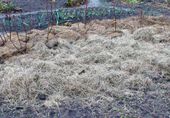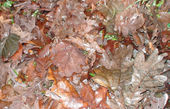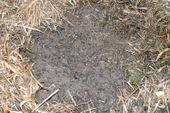Mulching
Underlying topic(s):
Topic in Gardening courses
Chunks of information
- Why should the soil of a garden be covered, preferably also through winter? Firstly, this protects the soil, against drying out but also against rainfall. When rain hits the soil directly, the soil fills up and there's little oxygen left. This causes the demise of many micro-organisms that are needed to keep the soil healthy and fertile. Also the roots of plants need oxygen. Furthermore a soil depleted of oxygen lowers in pH, which means that many nutrients in the soil are not available to plant anymore. Second, plants growing in autumn and some in winter use the nutrients available in the soil. In that way they don't go lost for your garden as the crops are either eaten or put in the compost heap. If the soil isn't covered with plants, rain rinses many nutrients into the ground water. A soil that goes through winter in this manner will be ready for new crops in early spring. It won't be much work to loosen it and it needs less compost or other fertilizers. It's a soil that invites to sow and plant.
Gallery
A greenhouse prepared for winter. A layer of straw covers all soil and protects the few plants that will stay the winter over. The straw copies the fallen leaves in a forest. Underneath, micro-organisms and little creeping animals will survive and work on the soil to make it healthy and fertile. Weeds are suppressed.
I'm preparing fields for autumn and winter. In an organic garden it is important that the soil is always covered. In this field you see turnips in the back. A pumpkin in the center, but it did not grow well due to a summer that's too cold and wet. In the front a few mullein plants that came up wild. Some onions, thyme and kale at the edges of the field. The circles in the center are formed by another species of turnips (Brassica rapa), which are commonly sown as green manure or for animal feed after the harvest of grain.
See also
External links
- Mulching Wikipedia





